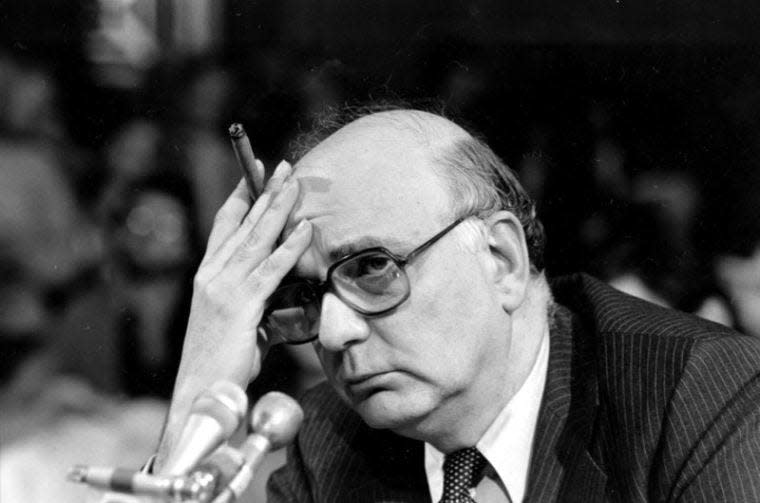America's inflation woes were caused by the moral hazard of cheap money | Opinion
America has sown economic wind, and now we shall reap the whirlwind. Most of us can’t be bothered with the nuances of monetary policy, but our leaders, both business and political, have all but ensured the realities of monetary policy will impose real pain in the months and possibly years to come.
Whether conservative or liberal, America’s economy rests heavily on a fiction about to catch up to us.
Inflation is the most painful indicator that something is off in our economy. Too many dollars continue to chase too few goods. That’s why prices have increased exponentially. Nobody likes it, but where did those extra dollars come from?
Before the COVID-19 pandemic hit, we already had cheap money coursing through our economy. For much of the last decade, interest rates have been at or near historic lows. When money is cheap, companies borrow more. They take economic risks they wouldn’t otherwise accept. Those gambles only need to be marginally successful to avoid economic calamity.
In the process, loaned money increases the supply of available dollars without necessarily increasing the amount of goods and services.
Hear more Tennessee Voices: Get the weekly opinion newsletter for insightful and thought provoking columns.
Bailouts and COVID stimulus reflect poor leadership
Economic shocks like a housing crisis or pandemic disrupt repayment plans. Some riskier loans and investments aren’t able to withstand changing markets. Normally, that would mean the business folds, investors take a bath, and employees lose their jobs.
Unfortunately, we live in a society that has too often removed failure as an accountability measure. Over the last 15 years, Democrats and Republicans alike have moved to bail out failing companies, lenders, and borrowers.
To make matters worse, Congress handed out checks during the COVID-19 pandemic to just about everyone. As a result, trillions of additional dollars have made their way into the economy.
Congress has led poorly on this issue by any standard. Low interest rates and high levels of government spending create a permanent economic underclass. Wealthy Americans have assets to leverage debt. They utilize relatively low interest rates to generate income during a period of high inflation.
The average American worker by contrast receives a wage that inflation suppresses through the high cost of goods. The rich get richer while irresponsible governmental and fiscal policies hammer everyone else.
Sign up for Latino Tennessee Voices newsletter: Read compelling stories for and with the Latino community in Tennessee.
Reflect on Paul Volcker's 'shock' to the economy
To protect the average American, Congress should connect interest rates to inflation by statute.

For example, if the Federal Reserve Board targets 2% inflation and America experiences 8% inflation, then the 6% delta should directly drive up interest rates. No economist wants to bring the economy to a screeching halt, but history’s road map is instructive.
To address the high inflation of the 1970s, Fed Chairman Paul Volcker pushed the federal funds rate to around 20%. He shocked the economy with short but acute interest rate hikes raging from 6 to 10 percentage points from 1979 to 1981.
The short-term economic pain in terms of employment and economic growth was real, but inflation receded. The result was an incredible period of economic prosperity.
Why should we wait for the Fed to do what we ought to demand as a matter of fiscal sobriety? Connecting inflation with interest rates also fights the lies coming out of Washington, D.C.
Sign up for Black Tennessee Voices newsletter: Read compelling columns by Black writers from across Tennessee.
How Congress can avoid spikes in inflation
Congress deficit spends like it’s drunk, and no real accountability ever materializes. It’s difficult because the House and Senate base decisions on fiscal projections.
As a young attorney working in Congress, I discovered that the greatest lie in Washington, D.C. is the 10-year budget window.

When most Americans hear about how much legislation will cost, the talking heads are usually referring to the balance between revenue generators (tax hikes, waste elimination, or program termination) and outlays (new spending, benefits, or programs) over a 10-year period. Predictably, spending happens while taxes and other revenue generation are much more difficult to maintain.
Connecting interest rates to inflation is a critical accountability mechanism. We should respond to what Congress does in the real world rather than what it plans to do. Inflation captures that activity. If Congress prints money to satisfy its spending appetite, inflation increases. We’re experiencing that now. If Congress truly balances taxing and spending, inflation shouldn’t spike.
When consumers can’t buy homes, cars, or education because of profligate Congressional spending, they’ll reflect their displeasure at the polls. It’s an actual tool to make fiscal responsibility great again, and prevent a permanent underclass punished by inflation without access to cheap capital.
If we want to address inflation and avoid an economic collapse, we must inflict the pain of materially higher interest rates. Between the Federal Reserve’s cheap money, and Congress’s addiction to deficit spending, we know exactly who to blame. Vote accordingly.
USA TODAY Network Tennessee Columnist Cameron Smith is a Memphis-born, Brentwood-raised recovering political attorney raising three boys in Nolensville, Tennessee, with his particularly patient wife, Justine. Direct outrage or agreement to smith.david.cameron@gmail.com or @DCameronSmith on Twitter. Agree or disagree? Send a letter to the editor to letters@tennessean.com.
This article originally appeared on Nashville Tennessean: America inflation woes were caused by the moral hazard of cheap money

